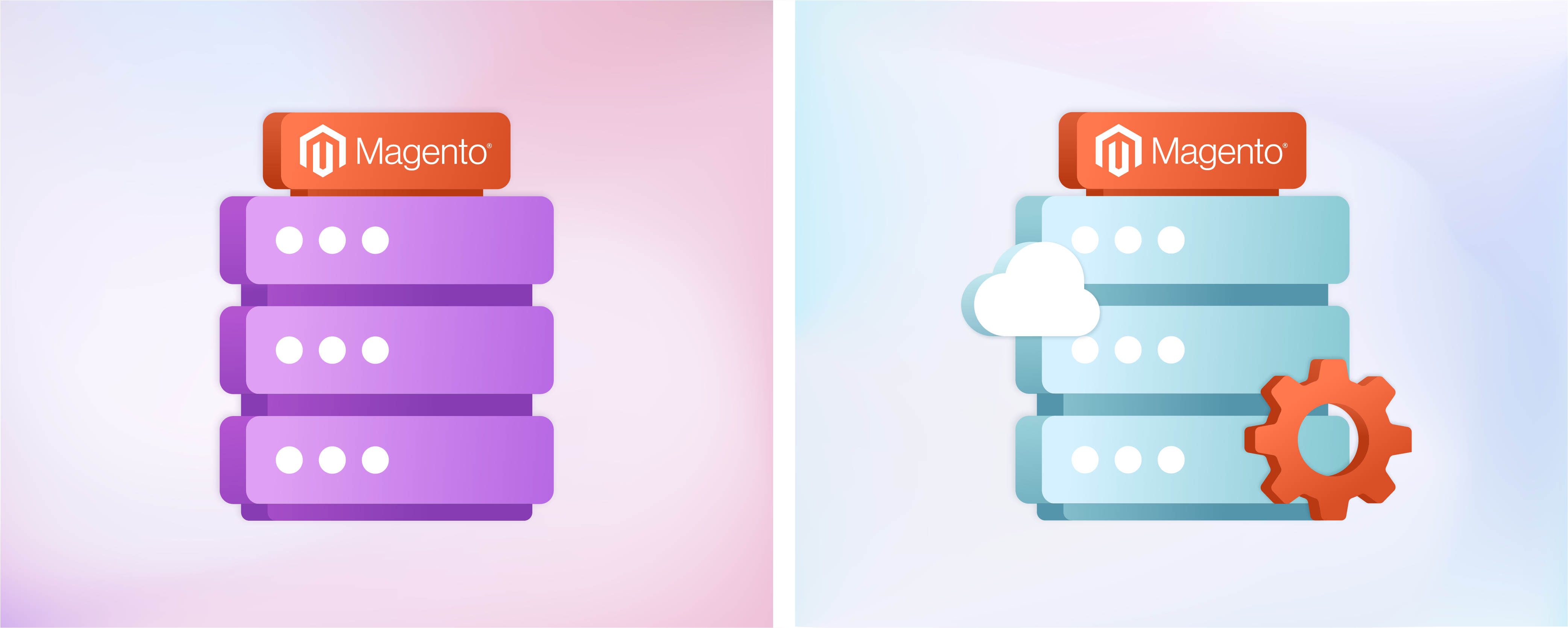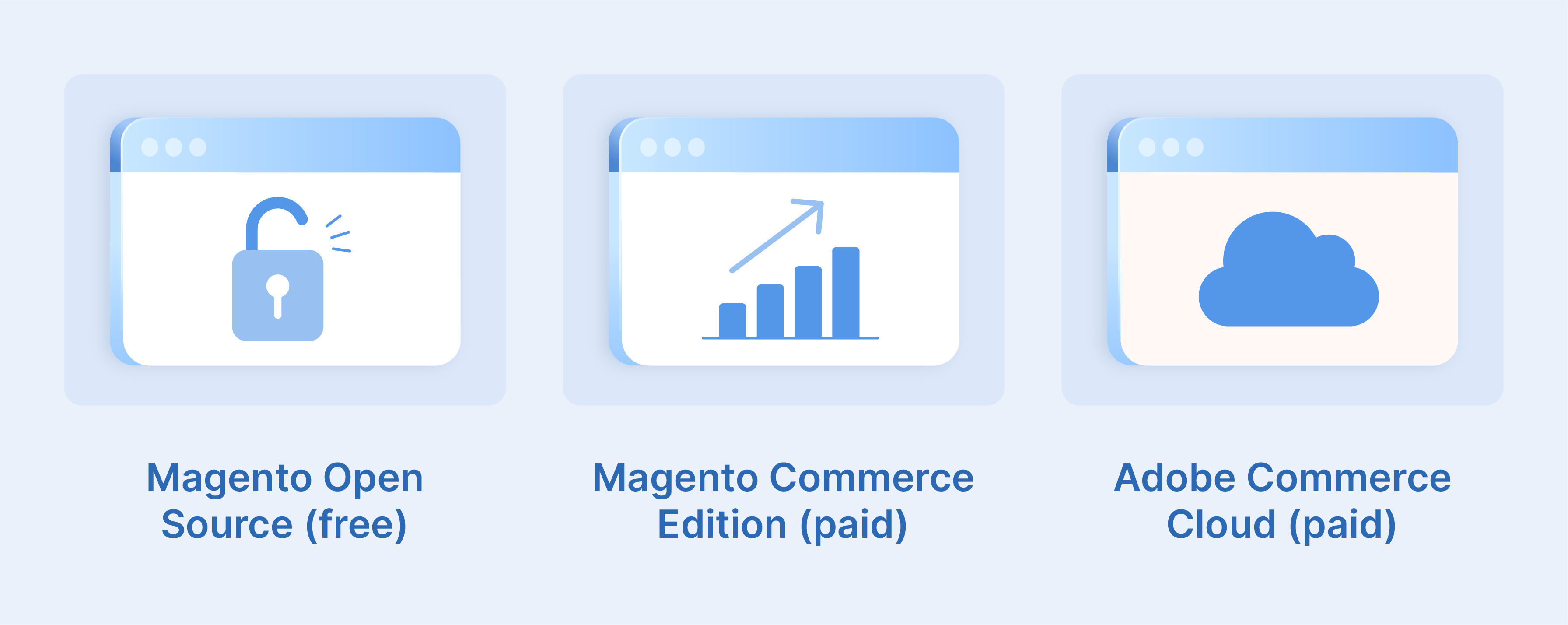
Magento Self-Hosted vs Managed Hosting: Pros and Cons
A Magento self-hosted process involves hosting and managing your Magento store independently with in-house servers or a provider of choice. Choosing to self-host Magento has its benefits and limitations. In this article, we'll discuss the advantages and disadvantages of self-hosting and share insights on alternatives and best practices.
Key Takeaways
-
Understand Magento self-hosted possibilities and benefits.
-
Learn the cost specifications and hosting choices of Magento Self-Hosted.
-
Explore the need for technical skills and security management.
-
Discover how managed hosting simplifies scalability and maintenance.
-
Compare Magento Open Source, Magento Commerce, and Magento Commerce Cloud to decide the best fit for your business needs.
-
Gain insights on selecting the best managed hosting provider for your Magento store.
What is Magento Self-Hosted?

Magento self-hosting means taking full responsibility for hosting Magento, including server setup, maintenance, and security. It differs from managed hosting as it demands you oversee server management yourself, without the support services offered by providers.
Magento offers two main editions: Magento Open Source and Magento Commerce. Both versions allow self as well as managed hosting. You can download and install both editions on your own server or choose your hosting provider. The former is free to use, and the latter is paid.
Benefits of Magento Self-Hosted
-
Facilitates Hosting Independence: You are free to select your own hosting solution. This allows you to be independent with your Magento store scaling. Self-hosting would work for a simple ecommerce environment. Comprehensive hosting support is required for improved functionality, appearance, and diverse system integration.
-
Cost-Effective for Beginner Users: It is a cost-effective option for small to medium-sized businesses, given you are prepared with server-side management requisites (setup, maintenance, and security).
-
Choice of Hosting Provider: You can choose your hosting provider based on specific needs, such as location, budget, and hosting server requirements.
-
Free from Third-Party Platforms: Self-hosting (on your own server) frees you from substantial SaaS/PaaS platform usage costs and constraints. This independence can result in greater savings but limits business flexibility.
Limitations of Magento Self-Hosted
-
Requires Technical Skills: To manage a self-hosted Magento environment, you must have technical skills in server management, security, and Magento customization. A lack of expertise can make store maintenance tough.
-
Security Expertise: In self-hosted setups, you handle security, not the provider. You must stay vigilant, regularly apply security patches, and comply with data protection laws.
-
Setup and Ongoing Costs: Although the initial setup of Magento Open Source is free, hosting and maintenance aren't. Costs for high-performance servers, backups, and expert help can add up.
-
Scaling Your Store: Growing your business means scaling your Magento store, which can be complex. It may involve server upgrades or later Magento store migration to handle more traffic.
-
Time Commitment: Setting up and customizing your Magento store requires a significant time investment. This effort can shift focus away from other business priorities.
Choosing Alternative: Opting for Managed Magento Hosting
Managed Magento hosting is where a hosting provider handles the technical aspects of running your Magento e-commerce site. It includes server setup, security, maintenance, updates, and support. You get the benefits of a Magento-optimized server without needing self-management or technical expertise.
The turnkey solution that lets you focus on your Magento store growth while experts take care of the technical backend. It's a cost-effective choice that frees up your resources. Choosing managed hosting optimizes your overall Magento experience.
Magento Self-Hosted vs. Managed Magento Hosting
| Feature | Magento Self Hosted | Magento Managed Hosting |
|---|---|---|
| Control | You have complete control over your hosting environment, tailoring it to your needs. | Managed hosting offers a balanced level of control, with experts handling the technical side. |
| Technical Expertise | You need to possess or acquire technical skills for server management and troubleshooting. | No need for deep technical expertise; the hosting provider takes care of all technical aspects. |
| Security | Security is your responsibility, requiring constant vigilance and updates. | The provider implements and manages enhanced security measures, offering you peace of mind. |
| Cost | While initially seeming cost-effective, unexpected expenses can arise from maintenance and security. | Predictable costs with a subscription model often offset by the savings on technical staff and infrastructure. |
| Scaling | Scaling requires manual intervention, potentially leading to downtime during upgrades. | Seamless scaling is managed by experts, ensuring your store keeps up with demand without interruption. |
| Time Investment | Significant time investment is needed for maintenance, updates, and management. | More time to focus on your business as the hosting provider handles the technical operations. |
| Support | You're on your own or need to hire experts for troubleshooting and support. | Access to dedicated support and Magento expertise, resolving issues quickly and efficiently. |
Magento Open Source vs. Magento Commerce vs. Magento Commerce Cloud

Both Magento Open Source and Magento Commerce offer you the flexibility to either self-host or use managed hosting services. Though Open Source usually becomes a good starting point, choosing Magento Commerce adds more advanced features.
Magento Commerce Cloud is an exclusively managed cloud hosting platform. It offers the most complete solution for high-performance cloud benefits, scalability, and security. Many additional features differ among these three different Magento editions.
| Feature Category | Magento Open Source | Magento Commerce | Magento Commerce Cloud |
|---|---|---|---|
| Store Management Tools | You manage multiple stores, currencies, and languages. You also handle tax management. | Includes all Open Source features and some more. | Includes all Commerce features, with cloud hosting benefits. |
| Supported Product Types | Supports simple, configurable, grouped, virtual, and downloadable products. | Adds bundle and gift card support to the Open Source offerings. | Inherits all product types from Commerce and is optimized for cloud performance. |
| Sales Tools | You have basic tools for related products, cross-sells, and upsells. | You get advanced options for promoting products. | You benefit from enhanced sales tools suited for cloud capabilities. |
| Price Management | Standard price management tools are at your disposal. | Advanced pricing tools help you manage costs effectively. | Advanced pricing tools are optimized for cloud efficiency. |
| Inventory Management | You can manage your inventory with standard tool utilization. | Your inventory management capabilities expand due to premium extension/plugin availability. | You receive the most advanced cloud-native inventory solutions. |
| Category Management | You handle categories with standard options. | You set advanced permissions for categories. | You access the full suite of category management features, cloud-optimized. |
| Order Management | You oversee orders, invoices, shipments, dispatches, and more, except for archiving. | You manage every aspect of orders, including archiving. | Your order management is fully featured, with added cloud functionality. |
Tips to Select the Best Managed Magento Hosting Providers
-
Assess Comprehensive Hosting Capability: Choose a hosting provider with a proven track record in Magento ecommerce. Vet them based on their capability to support Magento's specific hosting requirements and performance optimization.
-
Check Responsiveness: Confirm their hosting solutions support responsive design and cross-functional development. Your store must be mobile-friendly to accommodate customers shopping on various devices. A robust infrastructure ensures the site can handle different integrations and designs.
-
Uptime Guarantees: Look for hosting services that guarantee high uptime rates. This is critical for maintaining a reliable online store that's always accessible to customers.
-
Backup and Disaster Recovery: Choose a provider that aids with regular backups and a clear disaster recovery plan. Data safekeeping can be used to restore your site in case of any issues quickly.
-
Verify Service Compatibility: Ensure the hosting provider is technologically adept and aligns with your e-commerce goals. A good partner company understands your country's e-commerce regulations and customer needs.
FAQs
1. What is Magento Self-Hosted?
Magento Self-Hosted refers to running your store on your own or a chosen hosting provider's servers. This option allows full control over your e-commerce site's customization, performance, and security.
2. Can I switch from Magento Open Source to Magento Commerce on a self-hosted setup?
Yes, you can upgrade from Magento Open Source to Magento Commerce while remaining self-hosted. This transition allows you to access more advanced features and support although requiring individual control of your hosting environment.
3. What technical skills are required for Magento Self-Hosted?
Running a Magento self-hosted site requires skills in server management, security protocols, and maintaining Magento hosting requirements. It's ideal for those with web development or IT background or access to technical knowledge and support.
4. How does hosting affect the performance of a Magento Self-Hosted store?
Your chosen hosting solution directly impacts your store's speed, scalability, and reliability. Opting for a high-performance server with adequate resources is crucial for maintaining an optimal shopping experience.
5. What are the security responsibilities for Magento self-hosted users?
Self-hosted users are responsible for their server security. Your tasks usually involve applying Magento server security patches, managing SSL certificates, and implementing firewalls and malware scans. Ensuring all of this is essential to protect customer data and ensure a secure shopping environment.
6. Why choose Magento Managed Hosting over Self Hosted?
Magento Managed Hosting offers a worry-free approach to managing your site's technical needs. It's perfect if you prefer expert help to keep your store secure and updated. This choice lets you focus on business growth, not server management.
Summary
Magento Self-Hosted allows you to host your Magento store on personal servers. It helps balance benefits like cost-effectiveness and flexibility with challenges, including the need for technical skills and security management. Managed Magento Hosting presents a worry-free alternative for handling technical tasks so that you can focus on growing your business. Explore Managed Magento hosting solutions for robust e-commerce needs.

